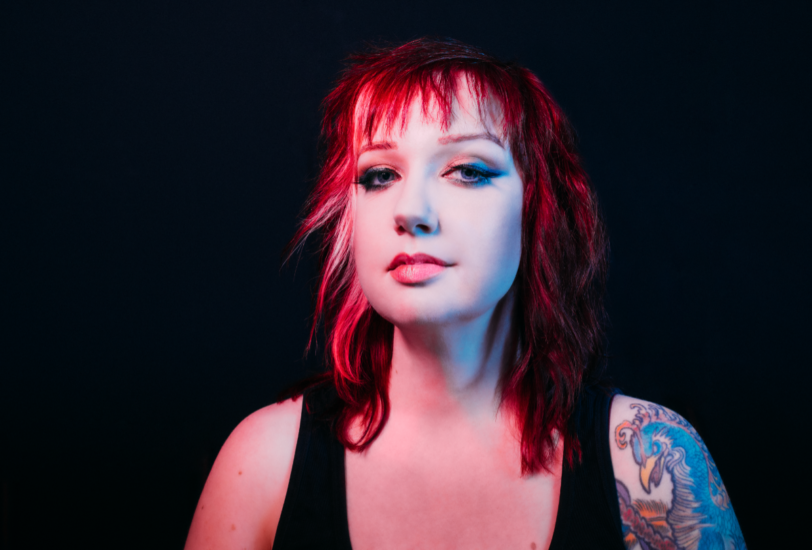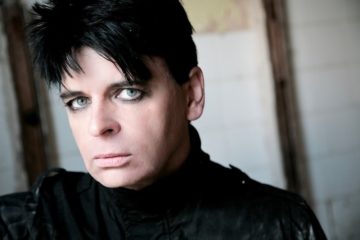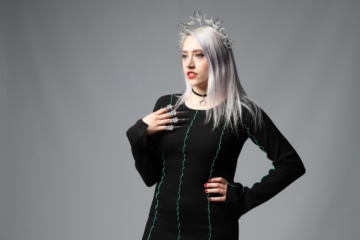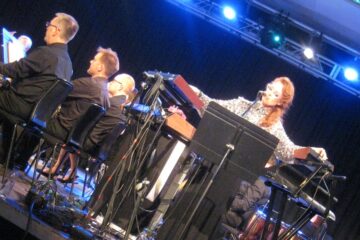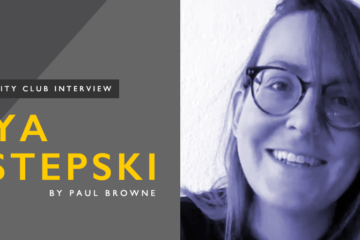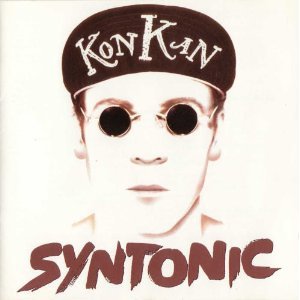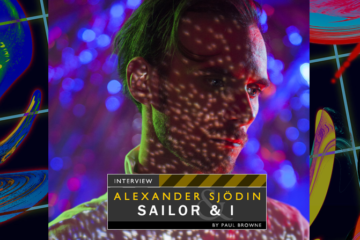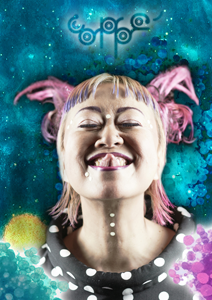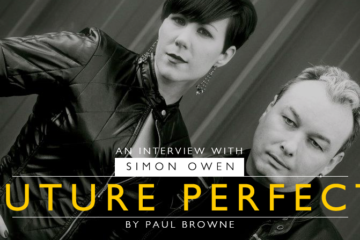Feel like I’m flying without a net…
One of the more intriguing electronic acts to appear on the TEC radar in recent years is Kat Bryan. The Canadian singer-songwriter served up debut album Music For The End Of The World in 2022 (see TEC review); an album dominated by brooding piano tones, a desaturated musical palette and a vocal delivery that had an ethereal, haunting fragility at its heart. Signed to the AnalogueTrash label, Bryan’s work is certainly a polar shift from your common-or-garden electronic act, but its darker, more soulful elements carry an effective emotional punch.
Now comes new EP Luna, a collection of songs that Bryan has described as capturing a “brighter tone” compared to her debut album, which was weighed down by a transitory period in Bryan’s life and the issues of the global pandemic when the songs were being composed. ”Luna by comparison” offers Bryan, “is the result of years of personal growth, artistic exploration, and embracing of a new way of existing.” Inspired by the symbolism of the luna moth, the result is a captivating series of compositions which have been dubbed “moth pop” as a result.
Prior to the release of Luna and ahead of a planned UK tour, Kat Bryan sat down with The Electricity Club to explore the ideas, inspirations and creation of her music…
![]()
Can you talk a little about your musical background and your initial influences?
I have been involved with music pretty much my whole life. As a kid, it was like choirs and that kind of thing. I took up guitar when I was around 14 and I did the whole late 90s folk singer, singer-songwriter type thing – Jewel, Sarah McLachlan, that kind of vibe. I did that for a few years and then I took about twenty years off! (laughs) and came back to it just before the pandemic started. It seems like fortuitous timing, but I decided that I was missing it as part of my life and want to get back into it. Then lockdown happened and it seemed like a really good opportunity to just dive full in. I couldn’t leave my house anyway, so, what else am I going to do? So that was when I started teaching myself production and my sound moved more into the electronic sound that we know now.
I think that was always what was in my heart and while I loved the folk thing, never quite fit right. So now that I had this whole box of magical instruments and tools to be able to create pretty much anything I wanted, this very like dark and hefty kind of synthy sound came out and that is definitely where I’ve directed over the past few years and developed that further.
As far as influences go, there’s probably a few. I know Garbage (if you’re a 90s alt fan) was a major influence on me. At the time, there was a lot of indie rock and a lot of singer-songwriter stuff and for me, the kind of revolutionary idea of putting like a rock band with an electronic act was kind of mind-blowing at the time. So they were a huge influence. Also, Niels Frahm, who’s a German composer. I’ve been very influenced by him and just a love of all things keyed – so pianos and organs and synths and all that kind of stuff. He does incredible things with a stage full of different keyed instruments and I’m kind of obsessed with that. I also like some classical influences, some jazz influences. There’s a lot of stuff in there.
What was the response like for your 2022 debut album Music for the End of the World?
It is the first full length release that I’ve done and it was the first one with AnalogueTrash and generally the reviews were quite positive. There was a lot of people who picked up on the beautifully dark vibe. ‘Goth pop’ was a phrase that kind of came out of that in that it is upbeat in a lot of cases, things you can listen to. But the lyrics are raw and very honest and very emotional. I was going through a lot of stuff when I was writing the songs for that, and I think that’s really apparent in the lyrical content. So the people who really listen to it definitely caught on to that. There was a lot of “are you OK? Like as a person, are you OK?” (laughs) Which was so lovely. Thank you to everyone who expressed concern. Absolutely I was going through a lot, but the music was a way of processing it.
So, with the new EP, Luna, it seems to have more lighter aspects to it than with your debut album. Can you perhaps describe or talk about some of the themes behind the songs?
It is definitely lighter than the album was. The album was written mostly in 2021 and that was like height of the pandemic and the world was on fire and everything was ending. I was also dealing with my own kind of trauma-processing of having realised that my grandmother was a narcissistic abuser and I had this thirty-year traumatic history behind that. Coming to terms with that and that whole process is like its own story. But it was a lot to deal with, so in 2022 was more when I was writing Luna and that was coming out of the darkness. It was having dealt with those really heavy emotions. It was coming out of the pandemic and being able to do things again and just feeling, I guess more hopeful for where the world was and for where I was going and feeling stronger, feeling more in control of myself and my life and I think the songs really reflect that.
The percussive moods of ‘Armour’ on the new EP is described as an “anthem for reclaiming your life”. Can you expand on this?
Yeah, that’s literally what it is. That was a song that I wrote directly in response to some of the reviews of the album that were saying things like “are you OK?” The main chorus in it is “I’m fine” (laughs). I’m better than I’ve ever been. I’m absolutely fine. When you’re dealing with trauma or hard things, there is this thing that people do where they want to protect you. They want to hide you away and keep you safe and it’s a very lovely expression of care. But there is also this need to break out of that. I need to be able to breathe, to claim my space and not be sheltered anymore. So I think that song was very much in that kind of perspective of “Thank you for the care but I got this, I’m good. I can handle this. I’m stronger than you think I am essentially.”
The track ‘Tight Rope’ seems to be an exploration of the expectations and pressure of being a musician. Would that be accurate?
Yeah, definitely. It’s also, I think, not just being a musician but also being online nowadays. A big part of being an indie musician now is being a content creator at the same time and there is an expectation that you are constantly posting and you are constantly present and you are constantly consistent with what you’re putting out there and who you’re presenting. And that pressure to be this kind of narrow vision of who you are as a person and just showing up all the time. I found myself trying to always be positive and being this like little ray of sunshine, like “you got this you, you can do it.”
But there’s times when I just didn’t feel that way. I felt depressed. I felt anxious. I’ve dealt with anxiety for a lot of my life and there are days that are just really hard. So I think that song is definitely a commentary on that feeling of having to still show up as this positive person, even though I wasn’t necessarily feeling.
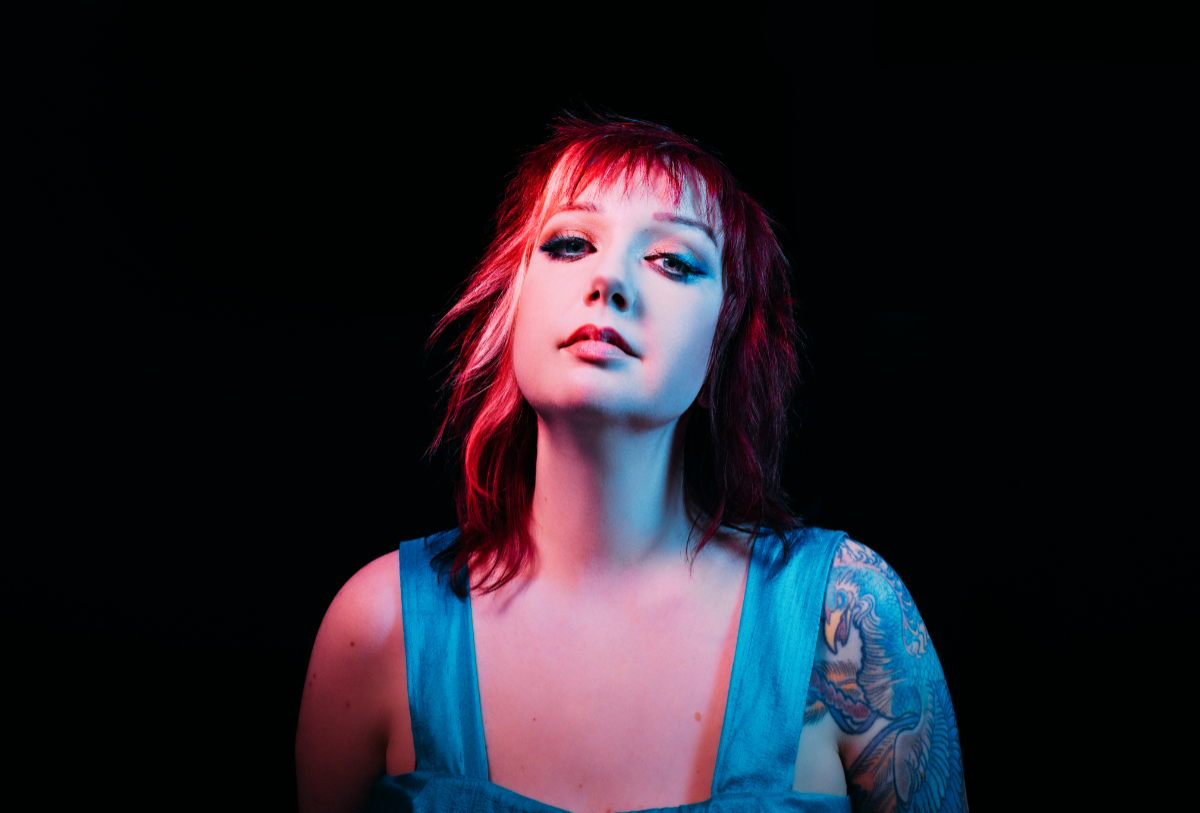
Previously, your music offered a commentary or sorts on topics such as climate change. Are you optimistic about where we currently are as a culture on this discussion?
No, I’m pretty sure it’s still a dumpster fire out there! (laughs) I don’t think it’s gotten any better. I like to think that as people that we’re hopefully moving towards a better place and being more understanding of the fact that the planet’s on fire but I don’t know. I go back and forth. I really want to be hopeful and think that we’re going to figure this out and we’re not all just going to burst into flame at some point or run out of oxygen or drown in massive floods or whatever, but I don’t know! (laughs) Really could go either way to be honest.
The EP title is inspired by the luna moth. Can you expand on the significance of this?
Yeah, the luna moth is so interesting. It did start off as a dream that I had a couple of years ago where I was in my apartment that I’m in now. But everything was covered in cobwebs and dust and these really thick layers of husk, cocoon-type stuff. I started pulling away that and all of these moths and butterflies just poured out and they were everywhere, covering every surface and all kinds of colours. And from that point on I just started seeing moths everywhere: there are people wearing moth jewelry and moth T-shirts. And I would see them just like randomly outside. They’d fly past my window. It became this thing where I was like, “what is happening? Why are there moths everywhere?” So I did a little bit of research on the historic symbolism of moths and it was about transformation and about unusual beauty. And there was something in that that just like really spoke to me as someone who has dealt with confidence issues their whole life and has felt like a weird outsider. The idea of something being unexpectedly beautiful really spoke to me. The idea of the cocoon and transforming and I was in this phase in my life where everything was shifting and I was becoming this new person. So I think it all it all just kind of fit. I still see moths everywhere.
That’s interesting because it also touches on the fact that you previously talked about your musical aesthetic being about darkness, about finding the beauty that’s in that darkness.
Yeah, I think that was a huge part of my trauma processing and evolution into a stronger person was thinking that being a person who likes the dark, who likes being on their own or they like the rain or they like the nighttime better. Or just being drawn to things that are dark. I’ve always had a Gothic thing to me. I like bats and that kind of stuff. Thinking that was wrong; that you’re supposed to want joy in your life. You’re supposed to want brightness and sunshine and summer and all this kind of stuff. And none of that ever resonated with me. So, then kind of sitting back and realising that there is nothing wrong with being a dark little rain cloud and enjoying things that are dark and things that are spooky or hard.
Just the idea of embracing not being in the light all the time. That if you need time to be by yourself in a dark place, just be in that place. Figure out what’s going on with you. Focus on what you need in order to feel ready to go back out into the world. But don’t feel ashamed of the fact that maybe you just don’t like the same things as everybody else.
Sure, I can completely identify with that sentiment myself. So, with live performances, do you find it difficult to translate your songs into a live environment?
I’ve been thinking about that a lot. Because with all these live shows coming up, obviously I want to put on the best show possible. I’ve always felt that my biggest strength is the songwriting and the lyrical content as well as just being a singer and being able to emote what I’m feeling through my voice. But I went through a lot of “you have to play more instruments; you have to do more on stage in order for it to be interesting”. But I found that all of that was just really taking away from connecting with the songs, which I think is really the most important part. If I’m not connected to the songs, then the audience isn’t going to be. So, I have to do what I have to do to really feel the songs so that I can more effectively communicate that to my audience and hopefully they will then feel it more deeply. And that’s kind of my goal.
Are your performing live shows in Canada at the moment?
No, I keep looking for opportunities out here, but I think the UK has been more receptive to what I do than Canada has so far. I mean the electronic community in Vancouver… at least, it’s here, but it’s quite small. We’re more like indie rock and pop rock and jazz is more popular here. So I’m hoping on the back of this tour that I’ll have a little bit more legitimacy to what I do, and people will be more excited to book me locally.
Can you describe a little bit about your typical studio set up?
An old Yamaha that my grandfather had. It’s from like the 80s, I think, but it’s just a basic Yamaha keyboard. I use that mostly for finding chords when I’m doing my vocal harmonies. Most of my songwriting is done in Ableton which is the DAW that I use. I have a little MIDI keyboard that I usually set up with some kind of piano-type sound and I find my chords and then I kind of add stuff in from there. I mean, I would love to have more physical instruments. There are definitely some traditional synth-type machines that I would love to have once I have some Income! (laughs) But for now, pretty much everything is VSTs, MIDIs, samples and then my own voice.
Obviously, these days it’s much easier to write and compose because you can actually do it in in your own bedroom.
Absolutely, yeah. When I was first writing songs back in the 90s, it was me and a guitar and I found it very frustrating because I had all of this stuff swirling around in my brain and just no way of getting it out. I didn’t have a drum machine. I didn’t have access to anything else. And at that point, Pro Tools was just becoming a thing. There was this whole exciting thing that Weezer had written one of their whole albums on Pro Tools by themselves. I think that was the start of the home studio thing, but it was still hugely cost-prohibitive. So, it was only when I was coming back to it in 2020 that suddenly it was like for under $1000 you can have an entire setup – and I didn’t even pay that because I had friends to help me out. But for a minimal amount of money, you can have like an entire orchestra at your fingertips.
Yeah, it does make a difference, which leads me onto my next question, which is what are your thoughts about the modern music industry?
I’ve already used the phrase “dumpster fire…” (laughs) It’s both super-difficult and super-supportive somehow. I don’t know how the two things work, but there is the gateway into becoming a successful musician, making enough money to live off. It’s really hard to get past that barrier. So on one hand it is easier to create music. It is easier to put music out there and it is easier to find a small group of people who really love what you’re doing and you can share ideas with. But it is also, I think, more difficult To get people to click on your link, to get people to save your song, to get people to actually listen to what you’re doing.
As far as making it big, all of the major opportunities are out there for people who have massive TikTok followings or huge numbers of streams, right? There’s this bar that you have to reach that is very difficult to really reach.
How are you finding your relationship with AnalogueTrash?
They have been so great and so supportive. It’s one of those really magical stories where I randomly sent them an e-mail with my demo, “please sign me!” (laughs) Having their support has been so amazing. They’ve been really good at using their own network to really get some plays, get some listeners. Get interviews like this one where I can actually talk about what I’m doing and hopefully reach a larger audience with what I’m doing. I wouldn’t have any access to any of this stuff on my own. It would be nearly impossible. So having their name behind me has been very helpful. But also just the emotional support. Everybody who signed to the label is such a lovely group and everybody just supports each other. It’s like a big family, so I feel incredibly lucky to be part of it.
![]()
Luna is released 1 September via AnalogueTrash.
Kat will also be joining in on a Luna Bandcamp listening party on Wednesday 30 August. Be among the first people to hear the EP in its entirety, as well as chatting to Kat about the EP’s themes and production. https://katbryan.bandcamp.com/merch/luna-listening-party-2
Kat Bryan will be performing in Salford (15/09), Leeds (16/09), Todmorden (17/09), Glasgow (22/09), Liverpool (24/09), Bristol (28/09), Coventry (30/09) and London (01/10) alongside a number of AnalogueTrash label-mates and friends.
https://t.co/X8IfS2NqDb
https://katbryan.bandcamp.com/
http://katbryanmusic.ca/
Spotify
https://twitter.com/KatBryanMusic
https://www.facebook.com/KatBryanMusic
Photos by Tanya Goehring Photography.


